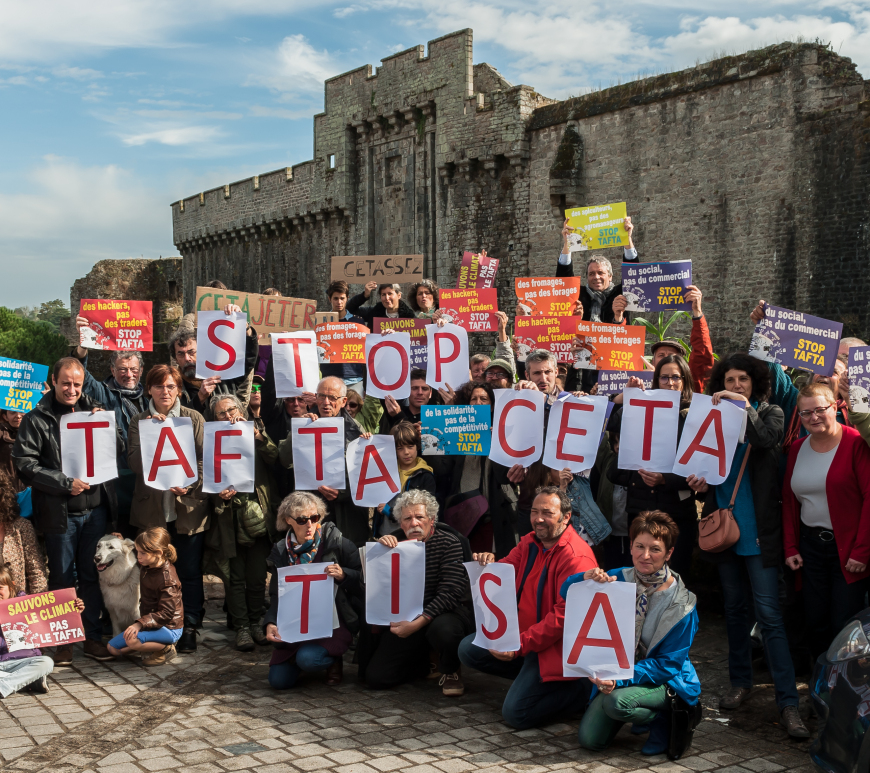Macron puts trade policy on summit table
All the versions of this article: [English] [français]
EU Observer | 19 October 2017
Macron puts trade policy on summit table
By ERIC MAURICE
A year after Wallonia’s last minute reluctance to sign off on an EU trade deal with Canada disturbed the EU summit last October, the future of EU trade policy will be back on the leaders’ table this week.
A discussion will take place during Thursday evening’s (19 October) dinner, at the request of French president Emmanuel Macron, over the scope and pace of future deals.
"It is important to have a political discussion" on the issue before the EU concludes or opens new negotiations, a French source explained.
Macron wants "an overall vision to find a balance between trade openness and protection" of EU markets and citizens, rather than "adding piece after piece" to the EU trade policy "puzzle", the source said.
The European Commission, which leads negotiations on trade in the name of the 28 member states, has said that it wants to conclude talks with Mexico and Mercosur - the South American single market - before the end of year.
Talks are also ongoing to finalise a trade deal with Japan, after a political agreement was reached last summer.
In his state of the Union address last month, the commission’s president, Jean-Claude Juncker, also said that he wanted to open negotiations with Australia and New Zealand.
After controversies over Ceta, the EU-Canada trade deal, and TTIP, the EU-US talks that were stopped after Donald Trump was elected US president, the French president will insist that the EU must preserve its social, environmental and tax standards.
Who has final say?
Following a ruling in May in which the European Court of Justice said that, in some cases, the commission can conclude deals without needing ratification by all national and some regional parliaments, Macron also wants to clarify the powers between EU institutions and member states in trade issues.
"We don’t want to solve everything at this summit," the source said, adding that after the discussion, it will be up to EU trade ministers to work on a "broader reform of the EU trade policy".
Macron has been advocating for a reform of EU trade and anti-dumping policies since the presidential campaign in France earlier this year.
In September, under French pressure, the commission presented a plan to screen foreign investments in strategic sectors. Paris also supported a new method of calculating dumping on some imports.
More recently, the French government expressed specific concerns about the negotiations with Mercosur, because beef imports from South America would hit French farmers.
Mandate from 1999
In a visit to Rungis, France’s and Europe’s largest wholesale food market, last week, Macron said he was "not in favour of hurrying" to conclude a deal, and he pointed out that the commission’s mandate to negotiate with Mercosur dated back to 1999.
"Our consumption, our industrial realities, our knowledge on sanitary and environmental issues have changed deeply," he said.
Later this month, the French government will also present new requirements for the implementation of Ceta, ahead of the vote in the French parliament to ratify the deal.
When Macron was elected, he set up a committee to examine the deal, which started to be provisionally applied on 21 September.
In a report published in late September, the committee made several recommendations, introducing tighter checks on Canadian meat that could contain hormones, and to improve information for consumers on agricultural production methods.
It also recommended establishing a climate "veto", to ensure that foreign investments respect plans to reduce carbon emissions, and to monitor more closely the composition and work of the investor court system (ICS) - a body to settle disputes between states and investors.
Some MPs, including in Macron’s majority, have said that they will ratify Ceta only if some of these proposals are introduced.
’Interesting discussion’
On Monday, before meeting Juncker in Brussels, French prime minister Edouard Philippe said that "not taking into account" the public’s concerns over Ceta, Mercosur and other deals "would be dangerous for trade policies, and also for the EU."
Juncker, who said that he would make efforts to meet French demands, noted nevertheless that he didn’t want that "every deal is considered by our fellow citizens as an attack against [Europe’s] main interests."
Macron’s desire to review or slow down trade talks are likely to be met with some wariness from his colleagues.
"When you talk about trade policy, there are always two camps that appear," a diplomat said, adding that European Council president Donald Tusk has "no intention to have a long debate" on the issue.
"This could be a rather interesting discussion," another diplomat said, noting that, in the EU, "we now hear talk of harnessing globalisation, rather than shaping it".






